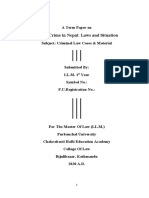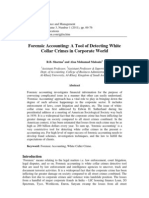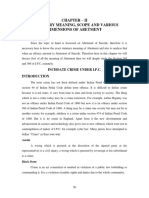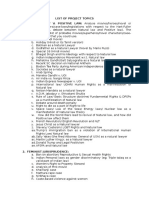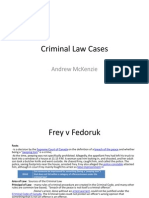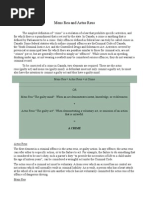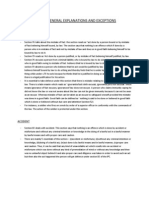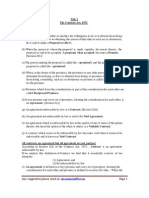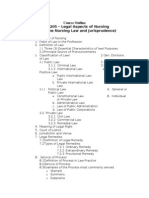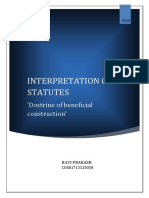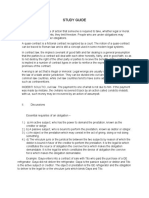Doctrine of Mens Rea
Doctrine of Mens Rea
Uploaded by
Amit ChaturvediCopyright:
Available Formats
Doctrine of Mens Rea
Doctrine of Mens Rea
Uploaded by
Amit ChaturvediOriginal Description:
Copyright
Available Formats
Share this document
Did you find this document useful?
Is this content inappropriate?
Copyright:
Available Formats
Doctrine of Mens Rea
Doctrine of Mens Rea
Uploaded by
Amit ChaturvediCopyright:
Available Formats
Mens rea
Mens rea is the mental intention, ill intention, or fudge the defendant's state at the time of offense,
sometimes called the guilty mind. In the IPC, 1860, Mens rea is expressed as "ACTUS NON FACIT
REUM NISI MENS SIT REA" as a fundamental principle for penal liability. Intent and Act, both must
concur to constitute a crime. An act itself is no crime, unless it is coupled with an evil / criminal
intent.
Mens rea is a cardinal principle of law. It means "Mental element or Evil intent or Guilty mind". It may
be defined as the mental element is necessary to constitute a criminal liability. Mere commitment of
offense is not enough but it has to be proved that the offense was committed with "guilty mind".
Example - If a while playing cricket a person is hit by a ball and dies, a person hitting the ball cannot be
charged with murder as there was no mens rea.
In criminal offenses generally, Mens rea has to be proved by prosecution and quality of proof
required is heavy i.E. It should be proved beyond reasonable doubt. Thus in criminal offences heavy
burden is cast on government authorities regarding proof and hence many people are released by the
court as a proof of mens rea (culpable mental state) " is not enough.
Exceptions to Mens Rea -
Exceptions to the Doctrine Mens Rea are as follows -
a) Strict Liability -
Even though there is no guilty mind the person is held responsible for the act. Only some special
statute creates those liabilities. Act passed by parliament. These offences are against Public Health for
which such strict or absolute liability is imposed, for example-Essential Commodities Act, Food and Drug
Act, Consumer Protection Act etc.
b) When it is difficult to prove Mens Rea -
Another exception to the doctrine Mens rea is where it is difficult to prove mens rea and penalties
are petty fines A statute may do away with the necessity of Mens rea on the basis of expediency. In such
petty cases, speedy disposal of cases is necessary and the proving of mens rea is not easy. An accused or
may be fined even without any proof of Mens Rea.
c) Public Nuisance -
Another exception to the doctrine of mens rea is in case of public nuisance. In the interest of public
safety, strict liability must be imposed. Whether a person causes public nuisance with guilty mind or
without guilty mind, he must be punishable.
d) Ignorance of Law no excuse -
Ignorance of law is no excuse. It is presumed that everybody knows the law of land. The principle of
ignorantia juris non excusat is followed in almost all legal systems. This is an irrebuttable presumption
that every person knows the law of the land.
Conclusion -
Mens rea is a technical term, generally taken to mean some blameworthy mental condition
whether constituted by intention or knowledge or otherwise the absence of which on any particular
occasion negatives and intentions of a crime. There are many exceptional cases where mens rea is not
required in criminal law some exceptions to the doctrine mens rea are mentioned above.
You might also like
- Criminal Law Book 1 Articles 1-20Document60 pagesCriminal Law Book 1 Articles 1-20Marcos Biteng73% (11)
- Crimes Research PaperDocument8 pagesCrimes Research PaperShalabh ThakurNo ratings yet
- Central University of South BiharDocument16 pagesCentral University of South Biharamresh9572kumar_9660No ratings yet
- Assignment Criminal Law MasterDocument7 pagesAssignment Criminal Law MasterAzlyna AzmanNo ratings yet
- Attempt - Law of Crime 1Document20 pagesAttempt - Law of Crime 1KDNo ratings yet
- Inchoate CrimesDocument156 pagesInchoate CrimesMandira PrakashNo ratings yet
- HomicideDocument5 pagesHomicidemaustroNo ratings yet
- Criminal Law - Impossible AttemptsDocument10 pagesCriminal Law - Impossible AttemptsAlexandraNo ratings yet
- Criminal Law NotesDocument41 pagesCriminal Law NotespresciousmbandarNo ratings yet
- Attempt To MurderDocument23 pagesAttempt To MurderBabita Basnet100% (1)
- Join and Constructive LiabilityDocument8 pagesJoin and Constructive LiabilityTejaswi SaxenaNo ratings yet
- White Collar CrimesDocument8 pagesWhite Collar Crimespr3universityNo ratings yet
- Crime and TortDocument19 pagesCrime and TortHaseeb KhanNo ratings yet
- Law of CrimeDocument23 pagesLaw of CrimeMoumita DebNo ratings yet
- Actus Reus LectureDocument4 pagesActus Reus LectureSyed HassanNo ratings yet
- Law School - Criminal Law NotesDocument8 pagesLaw School - Criminal Law NotesKJ100% (2)
- CHAPTER 3 Clasification of LawDocument10 pagesCHAPTER 3 Clasification of LawNazatulJuhariNo ratings yet
- 5 - Chapter 2 PDFDocument57 pages5 - Chapter 2 PDFMayank MishraNo ratings yet
- MATS Law School: Indian Penal Code-IIDocument16 pagesMATS Law School: Indian Penal Code-IIShivanshu SinghNo ratings yet
- Criminal Law . GSLDocument19 pagesCriminal Law . GSLSAMMYNo ratings yet
- Development of Criminal LawDocument8 pagesDevelopment of Criminal Lawyukta kapadiaNo ratings yet
- Notes On Law of CrimesDocument9 pagesNotes On Law of CrimesHari BansalNo ratings yet
- AbdmentDocument23 pagesAbdmentmilindaNo ratings yet
- Criminal Responsibility PaperDocument8 pagesCriminal Responsibility PaperJuven RenaldiNo ratings yet
- 2023 Bundle 1Document46 pages2023 Bundle 1Isabella Mohale SeipatiNo ratings yet
- Death Penalty - International AgreementDocument4 pagesDeath Penalty - International AgreementalingjomarNo ratings yet
- Constitutional Validity of Death Penalty in IndiaDocument75 pagesConstitutional Validity of Death Penalty in IndiaDeepsy FaldessaiNo ratings yet
- Introduction To Criminal LawDocument19 pagesIntroduction To Criminal LawtwbengsNo ratings yet
- The General Principles of Criminal Liability PPNTDocument24 pagesThe General Principles of Criminal Liability PPNTRups YerzNo ratings yet
- Preparation and Attempt in Accordance To IPCDocument11 pagesPreparation and Attempt in Accordance To IPCpratikminj100% (5)
- Criminal Liability AbbaDocument15 pagesCriminal Liability AbbaWilliam FundNo ratings yet
- BailDocument7 pagesBailLim Chon HuatNo ratings yet
- Sandstrom v. MontanaDocument1 pageSandstrom v. MontanaTaco BelleNo ratings yet
- Project TopicsDocument3 pagesProject TopicsAjith RamNo ratings yet
- Criminal Law OutlineDocument26 pagesCriminal Law OutlineThomas JeffersonNo ratings yet
- Crimal Attempt DissertationDocument6 pagesCrimal Attempt DissertationAntika DudejaNo ratings yet
- Necessity As A Defence Under Tort LawDocument13 pagesNecessity As A Defence Under Tort LawAshutosh Ashu Sharma0% (1)
- Principles of Criminal LiabilityDocument19 pagesPrinciples of Criminal LiabilityWAWOTOBINo ratings yet
- Criminal ProcedureDocument47 pagesCriminal Procedureshrinivas legalNo ratings yet
- Dr. Ram Manohar Lohia National Law University: Final DraftDocument8 pagesDr. Ram Manohar Lohia National Law University: Final DraftYoYoAviNo ratings yet
- ACCOMPLICEDocument5 pagesACCOMPLICEAbhi TripathiNo ratings yet
- Criminal Law CasesDocument97 pagesCriminal Law CasesNivedita MisraNo ratings yet
- Criminal Law Notce 0 - 1 PDFDocument92 pagesCriminal Law Notce 0 - 1 PDFShayant PathakNo ratings yet
- Mens Rea and Actus ReusDocument4 pagesMens Rea and Actus Reusapi-241698874No ratings yet
- Mental Element in Tortious LawDocument20 pagesMental Element in Tortious LawAnjali Gurumoorthy0% (1)
- Contract IllegalityDocument14 pagesContract IllegalityNii ArmahNo ratings yet
- IPCnotesDocument12 pagesIPCnotesSurbhi GuptaNo ratings yet
- National Law Institute University: Law of Torts - I Trimester-IDocument19 pagesNational Law Institute University: Law of Torts - I Trimester-Ivatsla shrivastavaNo ratings yet
- National Law Institute University, Bhopal: Trimester-ViiiDocument12 pagesNational Law Institute University, Bhopal: Trimester-Viiiharsha jeswaniNo ratings yet
- 63 0301-0721 PDFDocument4 pages63 0301-0721 PDFRichardNo ratings yet
- Doli Capax Is A Latin Term That MeansDocument1 pageDoli Capax Is A Latin Term That MeansAmit ChaturvediNo ratings yet
- Prevention of Corruption ActDocument10 pagesPrevention of Corruption ActVaibhav GargNo ratings yet
- Crime Its Meaning, Definitions by Different Juri+Document7 pagesCrime Its Meaning, Definitions by Different Juri+RISHINo ratings yet
- Mens ReaDocument5 pagesMens ReaAyathulla Hussain100% (1)
- Admissibility of Illegally Obtained EvidenceDocument5 pagesAdmissibility of Illegally Obtained EvidenceDHRUV GUPTANo ratings yet
- S V MakwanyaneDocument50 pagesS V MakwanyanestrawberryLips87No ratings yet
- Crime: How to Solve it - And Why So Much of What We're Told is WrongFrom EverandCrime: How to Solve it - And Why So Much of What We're Told is WrongNo ratings yet
- Mens ReaDocument6 pagesMens ReaRohitNarwariya100% (1)
- Doli Capax Is A Latin Term That MeansDocument1 pageDoli Capax Is A Latin Term That MeansAmit ChaturvediNo ratings yet
- Airborne Particle Size Chart - Engineering Design Micron ChartDocument3 pagesAirborne Particle Size Chart - Engineering Design Micron ChartAmit ChaturvediNo ratings yet
- Trade/Industry:: (I) Reduction in Multiplicity of TaxesDocument1 pageTrade/Industry:: (I) Reduction in Multiplicity of TaxesAmit ChaturvediNo ratings yet
- Chauhans Need To Streamline Investments, Increase Equity Exposure - The Economic TimesDocument4 pagesChauhans Need To Streamline Investments, Increase Equity Exposure - The Economic TimesAmit ChaturvediNo ratings yet
- Jeevan Saral: Golden Peacock Award Winner PlanDocument6 pagesJeevan Saral: Golden Peacock Award Winner PlanAmit ChaturvediNo ratings yet
- Sal Sheet MetroDocument3 pagesSal Sheet MetroAmit ChaturvediNo ratings yet
- Agreement + Enforceability A + E C: ContractorDocument9 pagesAgreement + Enforceability A + E C: ContractorAmit ChaturvediNo ratings yet
- Ohe ParameterDocument8 pagesOhe ParameterAmit Chaturvedi100% (2)
- CH 18Document7 pagesCH 18Amit ChaturvediNo ratings yet
- Unit 04 - Probability - 1 Per PageDocument40 pagesUnit 04 - Probability - 1 Per PageAmit ChaturvediNo ratings yet
- Trigno Metry FundasDocument17 pagesTrigno Metry FundasAmit ChaturvediNo ratings yet
- Institute of Management Technology: Centre For Distance Learning, GhaziabadDocument1 pageInstitute of Management Technology: Centre For Distance Learning, GhaziabadAmit ChaturvediNo ratings yet
- ICD Arch Page2Document1 pageICD Arch Page2Amit ChaturvediNo ratings yet
- Case DoctrinesDocument8 pagesCase DoctrinesSara Andrea SantiagoNo ratings yet
- Untitled NotebookDocument41 pagesUntitled NotebookHarneet KaurNo ratings yet
- Complex Crimes NotesDocument5 pagesComplex Crimes NotesAli BastiNo ratings yet
- RLR - Rule 90 To 109Document408 pagesRLR - Rule 90 To 109cinderkatt16No ratings yet
- Oblligation and Contracts Reviewer SummarizeDocument9 pagesOblligation and Contracts Reviewer SummarizeMaryBalezaNo ratings yet
- Mens Rea and Actus ReusDocument2 pagesMens Rea and Actus ReuskanupriyaNo ratings yet
- Torts Damages Case DigestsDocument756 pagesTorts Damages Case DigestsKent Wilson Orbase AndalesNo ratings yet
- Evidence Law CasesDocument3 pagesEvidence Law CasesveercasanovaNo ratings yet
- Peoria County Booking Sheet 06/10/13Document6 pagesPeoria County Booking Sheet 06/10/13Journal Star police documentsNo ratings yet
- Jurisprudence: Chapter Three (Islamic Jurisprudence) ©mohdbadrolawangDocument9 pagesJurisprudence: Chapter Three (Islamic Jurisprudence) ©mohdbadrolawangChalini RamuNo ratings yet
- Contract Act Essentials of A Valid Contract Void Agreements Performance of Contracts BreachDocument21 pagesContract Act Essentials of A Valid Contract Void Agreements Performance of Contracts BreachakramNo ratings yet
- Schools of Jurisprudence.Document24 pagesSchools of Jurisprudence.Gukiina Patrick100% (1)
- MEANING AND NATURE OF LAW HttpsDocument8 pagesMEANING AND NATURE OF LAW HttpsashishNo ratings yet
- Administrative LawDocument13 pagesAdministrative LawarunabhsharmaNo ratings yet
- Criminal LawDocument95 pagesCriminal Law5762HarriscNo ratings yet
- Legal AspectsDocument59 pagesLegal AspectsJanua NavaretteNo ratings yet
- M S .R 123087029 Ba. LLB (H .) : Uthu Rinithi ONSDocument9 pagesM S .R 123087029 Ba. LLB (H .) : Uthu Rinithi ONSMuthu SrinithiNo ratings yet
- Essentials of ContractDocument7 pagesEssentials of Contractsolitary soulNo ratings yet
- Consti 2 ArquilloDocument10 pagesConsti 2 ArquilloGertrude ArquilloNo ratings yet
- Dulay Vs CaDocument1 pageDulay Vs CaCeresjudicataNo ratings yet
- Ipc Bare Application:: Amendment 368Document18 pagesIpc Bare Application:: Amendment 368PranavNo ratings yet
- TOPIC: Extradition Law: Indian Perspective: Damodaram Sanjivayya National Law University Visakhapatnam, A.P., IndiaDocument15 pagesTOPIC: Extradition Law: Indian Perspective: Damodaram Sanjivayya National Law University Visakhapatnam, A.P., IndiaBharath SimhaReddyNaiduNo ratings yet
- Question and Answer in Criminal Law and Jurisprudence Set 1 By: Charlemagne James P. RamosDocument203 pagesQuestion and Answer in Criminal Law and Jurisprudence Set 1 By: Charlemagne James P. RamosHermann Dejero LozanoNo ratings yet
- Wills My PartDocument30 pagesWills My PartMadelle PinedaNo ratings yet
- Assignment NEGLIGENCEDocument2 pagesAssignment NEGLIGENCEsaiful ramadhanNo ratings yet
- Final Presentation Uffata SeeraaDocument47 pagesFinal Presentation Uffata SeeraaADUGNA DEGEFENo ratings yet
- (Summary) Agabin ChapterThreeDocument5 pages(Summary) Agabin ChapterThreeFina SchuckNo ratings yet
- Ravi Prakash Beneficial-Construction-of-Statutes IOSDocument9 pagesRavi Prakash Beneficial-Construction-of-Statutes IOSShivamPandeyNo ratings yet
- Study GuideDocument2 pagesStudy GuideNeilLaurrenceDimal100% (1)










